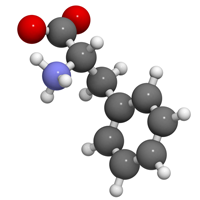 Phenylalanine is an amino acid with the chemical formula C6H5CH2CH(NH2)COOH. It has two distinct forms known as enantiomers, including L-phenylalanine and D-phenylalanine. A mixture of these two enantiomers is called a racemic mixture of phenylalanine. L-phenylalanine is an essential amino acid that has many naturally occurring sources. Significant sources of D-phenylalanine generally do not occur in nature, so it must be synthesized in the laboratory. D-phenylalanine is not an essential amino acid, but it is one of the few D enantiomers of amino acids that are pharmacologically active.
Phenylalanine is an amino acid with the chemical formula C6H5CH2CH(NH2)COOH. It has two distinct forms known as enantiomers, including L-phenylalanine and D-phenylalanine. A mixture of these two enantiomers is called a racemic mixture of phenylalanine. L-phenylalanine is an essential amino acid that has many naturally occurring sources. Significant sources of D-phenylalanine generally do not occur in nature, so it must be synthesized in the laboratory. D-phenylalanine is not an essential amino acid, but it is one of the few D enantiomers of amino acids that are pharmacologically active.
Phenylalanine was first isolated in 1879 from yellow lupine seedlings and was initially described with the empirical formula C9H11NO2. It was synthesized for the first time in 1882 from ammonia, hydrogen cyanide and phenylacetaldehyde. Marshall W. Nirenberg and J. Heinrich Matthaei discovered the DNA codons for L-phenylalanine in 1961, which are uracil-uracil-cytosine (UUC) and uracil-uracil-uracil (UUU). Their work essentially consisted of inserting multiple repeats of uracil into the genome of E. coli, which helped to correlate the information in nucleic acid with the expression of proteins in living cells.
D-phenylalanine is typically available only in the form of health supplements. It is sold as both pure D-phenylalanine and as part of a racemic mixture of phenylalanine. D-phenylalanine’s pharmacological effects generally relate to its ability to inhibit the actions of enzymes that affect the brain and nervous system.
The primary use of D-phenylalanine as a health supplement is the relief of discomfort. It may also help to support neurological and joint functions.

D-phenylalanine may help support the normal functioning of the nervous system, according to some studies. This effect is especially useful for individuals over the age of 50.
D-phenylalanine can help to support healthy mental functioning. Common issues in this category include low moods and difficulties with concentration.
D-phenylalanine may inhibit the production of enzymes that break down endorphins, which are associated with feelings of pleasure. The action of D-phenylalanine may therefore help to reduce the perception of discomfort.
Supplements of D-phenylalanine may help to manage healthy joint function, especially for older people.
Chronic discomfort is the most significant sign that you may need D-phenylalanine supplements. Common causes of this type of discomfort include alcohol withdrawal and age-related joint conditions. Neurological signs that may indicate that D-phenylalanine could benefit you include low moods and a short attention span. This is especially likely if you are unresponsive to standard treatments for these disorders. An inability to feel pleasure may also mean that you could benefit from D-phenylalanine.
L-phenylalanine, DL-phenylalanine

In our pursuit of vibrant health, many of us strive for a balanced diet packed with nutrient-rich foods. However, even the most wholesome diet may still leave us lacking in essential nutrients, particularly Omega-3 fatty acids. Healthy Eating is O...

Support for Mood Disorders 5-HTP Background and Benefits 5-Hydroxytryptophan (5-HTP) is an amino acid that occurs naturally in the human body. Its primary use in the human body is as a precursor in the conversion of tryptophan into the neurotransmitters melatonin and serotonin. 5-HTP is available...
Shipping calculated at checkout